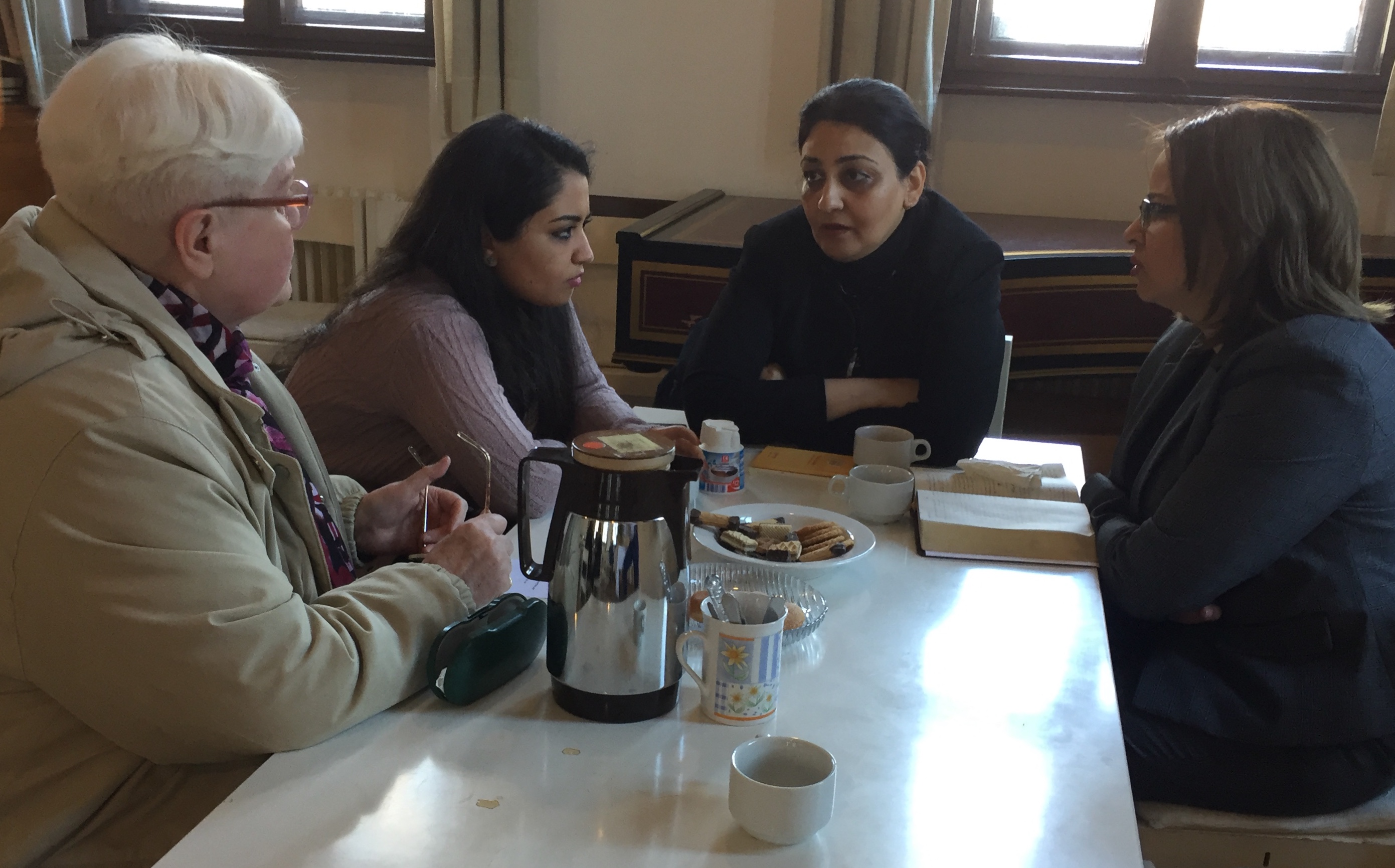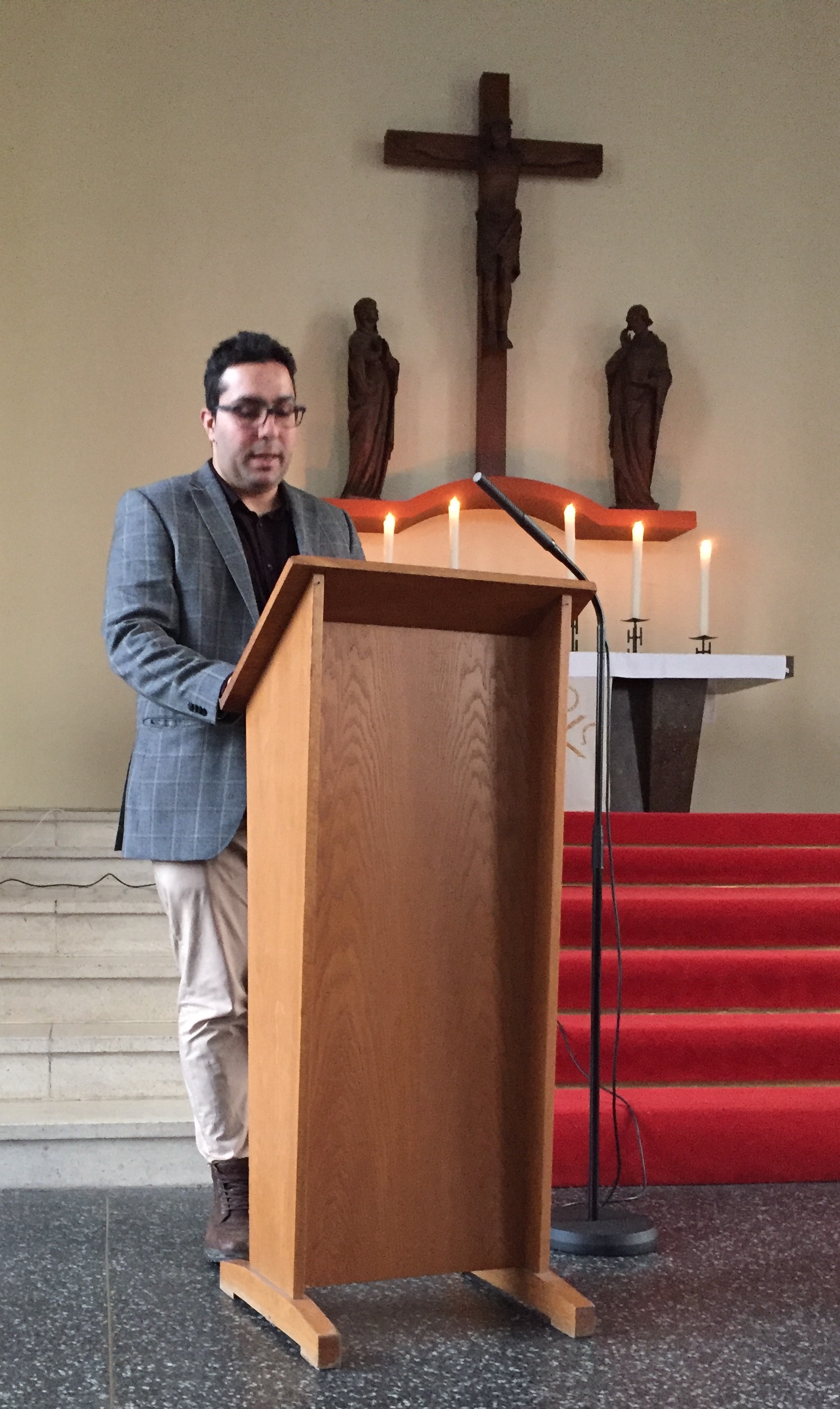A Letter from Ryan and Alethia White, serving in Germany
May 2018
Write to Ryan White
Write to Alethia White
Individuals: Give to E200500 or Ryan and Alethia White’s sending and support
Congregations: Give to D507565 for Ryan and Alethia White’s sending and support
Churches are asked to send donations through your congregation’s normal receiving site (this is usually your presbytery
Javeed spoke of the troubles he had in his family. These troubles led him to find comfort in alcohol. Dependency developed and began to destroy his life until he found hope and support through an AA group in Iran. His journey through AA led him to the One he could depend on and call his Good Shepherd. But deciding to follow Jesus in Iran is a difficult endeavor. Javeed tried to go to one of the historic and authorized Christian communities, only to be turned away at the door of the church because it was illegal for him to convert, and his presence in the community would endanger the delicate standing of the church. But despite the challenges, he continued to be drawn to Jesus and wanted to live in a place where he could freely choose his religion.
Recently, there was a collaborative service between the Iranian congregation and the Flüchtlingskirche (refugee church). The theme of the Sunday was oppressive governments and leadership and came from Ezekiel 34:1-16, which contrasts the “false shepherds” and God as one who shepherds. Javeed, who has been active in the Iranian Presbyterian church, spoke about his difficult experience in his home country in light of Ezekiel. Dorothea, the pastor of the Flüchtlingskirche, spoke about her perspective as a German, still aware of the country’s past aggressions, and about the resistance groups during the second world war. Ryan followed up with a reflection on John 10:1-12, noting that there are many voices calling for our attention, such as popular culture, advertisements and political leaders. Amidst all these voices, how can we discern the voice of God, our Good Shepherd?
Though the Iranian church does not have a choir, those of us who attended the service shared two songs in Farsi. One song came from the well-known Psalm 23, and the other was Aramiye delhayee, which is probably the most beloved worship song in Farsi. The lyrics proclaim that even when our hearts are troubled like a ship in a storm, we can look to Jesus as our captain and find peace.
This spring has brought a sudden and vibrant blooming across the city’s green spaces and within the faces of people more than ready to shed the grey chill of winter. The verb “to bloom” in German is similar in sound, “blühen,” and also means to thrive or flourish. I think it’s a lovely word, lighter in sound than in English and full of reverence for something beautiful. In the midst of all this blooming, the Iranian Presbyterian church has not only been enjoying the use of the flower-filled church garden, but has also been part of several fruitful joint events this spring.
We celebrated Noruz, the Iranian new year, on the spring equinox, March 20, and jumped over fires together to ring in the new year with hope. During this same time, the Iranian church was invited by our host German church to participate in a series of joint services and meals together. This was organized by the intern at the German church, and the Germans and Iranians took turns cooking the meals. You can imagine it was quite the opportunity for each group to experience the other’s traditional foods: wurst and potato salad from the Germans, asch reshte (bean, lentil, noodle, and herb soup) from the Iranians. Asch reshte has been described to us as a national dish that varies from region to region in Iran. We think it is delicious.
During this spring, with all that is calling for our attention in our families, our neighborhoods, cities, our countries, and our global community, we might ask ourselves: where can we bloom? Where can we foster ausblühen, literally, blooming out? How can we encourage others to bloom where it is needed? How can we participate in making something beautiful on this earth where it is easy to see areas of ugliness or pain?
On recent sunny spring mornings, I (Alethia) have been sitting in our garden, enjoying the rest of my coffee and the flowers we have planted this year — an experiment for us as there is not much direct sun and the earth either stays too damp or dries out suddenly. Successful blooming requires attentiveness. We like to share this garden space when we can with friends who need some peaceful green space in the midst of the city. I also like to use this blossoming place as a space to pray for those we know who are living in stress and uncertainty and missing family members in their home countries. For people who live in places of conflict and war. There is still beauty springing from this earth. How can we plant it where it is most needed? Do we see God’s beauty in these places? I can’t easily reconcile the ideas of terrible conflict, injustice, and war and the beauty I see in God’s creation, a small slice of which is our garden. Prayer is perhaps one way to confront seemingly irreconcilable concepts, and so I sit in the garden and pray. Perhaps we can think together of how we might plant beauty in the ugliest of places.
Thank you to each of you who continue to join us in our musing, our work here in Berlin, and the challenges and celebrations that come with it. Your prayers, emails, financial support, generosity, and encouragement are not only invaluable support to us, but, in turn, also the communities we work with here. We are thankful for you! We look forward to seeing some of you this coming summer during our travel and itineration on the West Coast. In the meantime, let’s join together in planting some beauty, not where it would be most admired or appreciated, but where it is most needed.
With peace,
Ryan, Alethia, Ariella, and Laila
![]() You may freely reuse and distribute this article in its entirety for non-commercial purposes in any medium. Please include author attribution, photography credits, and a link to the original article. This work is licensed under a Creative Commons Attribution-NonCommercial-NoDeratives 4.0 International License.
You may freely reuse and distribute this article in its entirety for non-commercial purposes in any medium. Please include author attribution, photography credits, and a link to the original article. This work is licensed under a Creative Commons Attribution-NonCommercial-NoDeratives 4.0 International License.

